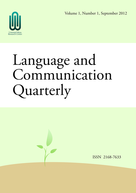


Volume 10 Issues 1-4 (2021-12-31)
Volume 9 Issues 1-4 (2020-12-31)
Volume 8 Issues 1&2 (2019-06-30)
Volume 7 Issues 3&4 (2018-12-31)
Volume 7 Issues 1&2 (2018-06-30)
Volume 6 Issues 3&4 (2017-12-31)
Volume 6 Issues 1&2 (2017-06-30)
Volume 5 Issues 3&4 (2016-12-31)
Volume 5 Issues 1&2 (2016-06-30)
Volume 4 Issues 3&4 (2015-12-31)
At present, the development of research and teaching of EFL teachers in colleges and universities in China is seriously unbalanced, and research has become a weakness of these EFL teachers. However, the research ability is a required qualification for college English teachers, so it is important to study their current research status and engagement and propose corresponding countermeasures for improvement. Using narrative questionnaires and focusing on one university in southern China, this study examines 30 college English teachers in terms of their research attitudes, outcomes as well as their research environment. Their challenges in conducting research are identified. Important implications for the EFL teacher professional development, EFL discipline construction, doctoral training, and EFL research dissemination are discussed.
The purpose of this quantitative study was to investigate the English for specific purposes (ESP) needs for college students and teachers at one Chinese university. The participants included 201 students and 155 teachers at this university. Five point Likert scale teacher and student questionnaires were used for data collection. The results show that the ESP needs for the teachers were significantly higher than for the students; the ESP needs for the English double major (E+) students were significantly higher than for the English major students. Further, the teacher participants had positive views on the ESP. They believed that the ESP teaching should be feasible for both the E+ and English major students. Important implications for the ESP teaching and learning are discussed.